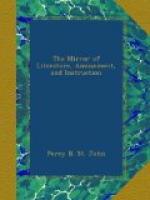* * * * *
In the barbarous ages it was usual for persons who could not write, to make the sign of the cross in confirmation of a written paper. Several charters still remain in which kings and persons of great eminence affix “signum crucis pro ignoratione literarum,” the sign of the cross, because of their ignorance of letters. From this is derived the phrase of signing instead of subscribing a paper.
* * * * *
COLUMN IN BLENHEIM PARK
[Illustration: Column in Blenheim Park.]
(To the Editor of the Mirror.)
You have lately directed the attention of the readers of the MIRROR to the park of Blenheim, in Oxfordshire, one of the most beautiful England can boast of, and likewise, according to Camden, the first park that was made in this country. I can bear witness to the correctness of your delineation and description of Rosamond’s Well, which you gave in a recent number; but there is no trace whatever of the bower or labyrinth, the site of which is only pointed out by tradition. The park of Blenheim, besides the interest which attaches to it from the circumstance of its having been the residence of the early kings of England, and the scene of “Rosamond’s” life, has in more modern times acquired additional interest from having been bestowed by the country upon the Duke of Marlborough, in testimony of the gratitude of the nation for the brilliant services he had rendered his country, particularly at the battle of Blenheim.
It was a reward at once worthy of the English nation and of the illustrious hero on whom it was bestowed; and as it is at least pleasing, and perhaps useful, to recall to the mind the epochs of England’s greatness amongst nations, I have sent a sketch of one of the most prominent objects in the park of Blenheim, which our forefathers deemed (in the language of the inscription) would “stand as long as the British name and language last, illustrious monuments of Marlborough’s glory and of Britain’s gratitude.” This is an elegant column, 130 feet in height, and surmounted by a statue of the warrior in an antique habit. On three sides of the building there are nearly complete copies of the several Acts of Parliament by which the park and manor of Woodstock were granted to the Duke of Marlborough and his heirs; and on the fourth side is a very long inscription, said to have been penned by Lord Bolingbroke, which concludes thus:—
These are the actions of the Duke of Marlborough,
Performed in the compass of a few years,
Sufficient to adorn the annals of ages.
The admiration of other nations
Will be conveyed to the latest posterity,
In the histories even of the enemies of
Britain.
The sense which the British nation had
Of his transcendant merit
Was expressed
In the most solemn, most effectual, most
durable manner.
The Acts of Parliament inscribed on the
pillar
Shall stand as long as the British name
and language last,
Illustrious monuments
Of Marlborough’s glory and
Of Britain’s gratitude.




